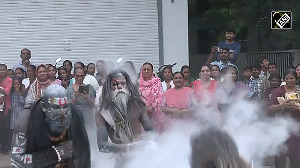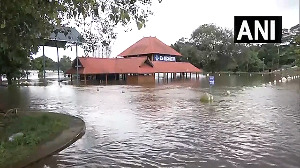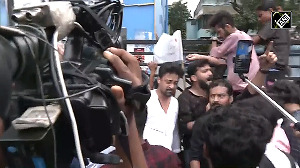"It is most unfortunate that these things (transfer of nuclear technology) happened due to the peculiar nature of the circumstances and loose arrangements in those early days and because of the personal obligations of previous governments to these countries," says the undated ISI report obtained and released by the Fox News on Sunday.
The ISI report, Fox News said, was based on the questioning of A Q Khan and others by the Pakistani spy agency. It was circulated to western intelligence agencies after Pakistan refused to produce Khan for questioning, the news channel said. However, the report has no reference to North Korea, which the western countries say was also a recipient of the clandestine nuclear technology from Pakistan.
In the report, the ISI also conceded that Pakistan used every legal and illegal means to obtain nuclear technology and establish the plant to make atomic weapons in the country.
"When the (atomic research) organisation was set up in mid 1976, a free hand was given to the Project Director to acquire each and everything through any means," it said.
"There was a direct and imminent threat to Pakistan's security and existence in the wake of the dismemberment of the country in 1971 and after the Indian nuclear test in 1974," it said.
Ziaul Haq, the then Pakistan President, had openly proclaimed that "beg, borrow or steal" was the policy of the day in the light of the imposition of stringent embargoes and restrictions on any nuclear-related materials and equipment to Pakistan, the ISI said.
Pakistan, being an under-developed country with no industrial infrastructure, had to buy each and every bit of material and piece of equipment surreptitiously from abroad in the open market and had to establish a network of cover companies within the country and outside to by-pass embargoes and import all the necessary items, it said.
Such companies were operating in Kuwait, Bahrain, United Arab Emirates, Singapore, United Kingdm, Germany, Luxembourg, Switzerland etc, the ISI report said.
Since no industrial infrastructure was available within the country, production drawing of all the components of the centrifuge machines were sent to England, France, Germany, Switzerland, Holland etc for the placing of orders for thousands of components and equipment required in order to expedite the work, which was a race against time, it said.
"Dubai, having no customs formalities or restrictions and no financial impediments, was made the main operating centre. All the foreign suppliers (Dutch, British, French, Turkish, Belgian, Swiss, German etc) were regularly coming to Dubai to discuss offers and orders.
"A company named Ben Belilah Enterprises, owned by an Arab police officer, was introduced by A Salam, a British national," it said.
"BBE had a Sri Lankan Manager named Farooq. Salam and Farooq, both being Tamils, were good friends. Due to the frequent meetings between our experts and the foreign suppliers, sets of almost all the drawings were kept in Dubai in a flat that had been rented especially for this purpose so they wouldn't have to be carried to and fro all the time," the report said.








